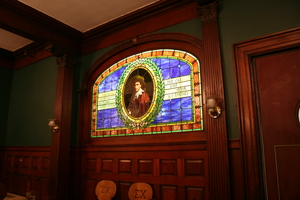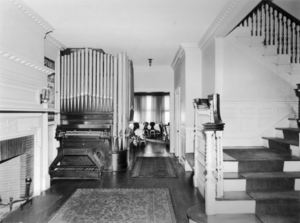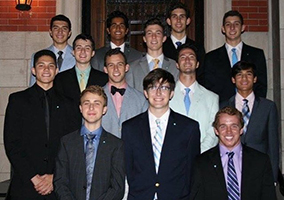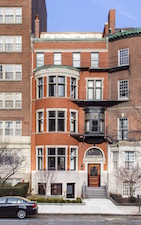Chapter History
A Brief History of Alpha Theta
In reviewing these one hundred and thirty years, one quickly is impressed by the diversity of the Alpha Theta life -- the evolving spirit and attitudes of these men. Many leaders in industry, education, and national affairs have shared in this lifestyle since 1882. In an attempt to better understand this "Spirit of Sigma Chi" at Alpha Theta, and the effect it has had on all our brothers, a brief history of our chapter has been compiled.
The MIT Chapter of the Sigma Chi fraternity was founded as a social and literary society in March 1882, by ten men, including T. Coleman duPont, the illustrious financier, U.S. Senator, and president of the E.I. DuPont Company. Two of the ten founders had originally attempted to establish a local fraternity in the fall of 1881, but were unsuccessful. By a stroke of luck, it subsequently happened that eight of the founders went to New York to a football game, where they met members of Northwestern's Sigma Chi (Omega) chapter. From this discussion of fraternities, the eight returned to Boston, more determined than ever to succeed in their work. In February, they petitioned the national fraternity (at Ohio Wesleyan, the old Gamma chapter), and on March 21, 1882, they were granted a charter. The next day, the chapter, with two additional charter members, was installed by members Orlo D. Skinner and William B. Meyers of the Phi chapter of Sigma Chi (Lafayette College); all the participants were treated to a resplendent first initiation banquet in the Brunswick Hotel. The original members, in pledge order, were:
- Herbert F. Bardwell
- Winthrop Alexander
- Frederick O. Harriman
- Edgar C. Hillyer
- Henry F. Baldwin
- Frank F. Johnson
- T. Coleman DuPont
- Robert B. Moore
- Charles A. Herpic
- Daniel A. Campbell

In the 1880s and 1890s, the Boston Tech (founded in 1861), like other technical schools of this era, drew almost all of its students from local communities, and thus, many of the usual aspects of student life developed slowly. Nevertheless, the early Sigma Chis led the development of student life at the young technical institute at a time when the image of the college man as socialite and athlete was developing nationally. The sports at MIT were tug-of-war, track, baseball, fencing, sparring, "hare and hours", and the somewhat trendy and controversial college football. Athletics such as these, along with the freshman-sophomore "Cane Rush" formed the core of student activities at MIT at the time of the founding of Sigma Chi. In contrast, a student government was not formed until a decade later, and the student paper and intercollegiate football teams belong to roughly the same area. Senior House, the first dorm on the new campus in Cambridge, was founded in 1918.
Partly due to historical accidents and necessity, the fraternities at MIT have been a more formative and responsible influence on student life at MIT. From these beginnings, the group has had to run its own affairs and plan its own accommodations, meals, and the like, which no doubt, has been a profoundly educational experience. Significantly, the growth of Sigma Chi and the fraternity system at MIT has also paralleled the establishment of MIT's international reputation. This can be further gauged by the observation that seven of the founders of the Alpha Theta chapter were from outside the New England States, including two from across the continent: Frederick C. Harriman, from Mexico, and Frank Johnson, from Idaho.
At first, fraternity life centered about weekly business meetings, in the members' rooms, chaired by the first Consul, Winthrop Alexander '83. Every now and then a general meeting and banquet was held in one of the downtown hotels, with spirited toasting and singing preceding the serious business of electing officers for the coming year. The chapter weathered the early years, and as the founders graduated, new members took on the responsibilities of the chapter. Financially difficult times did not endanger the chapter, although early in the 1890s the chapter found it difficult to get the usual number of new members. Fortunately, these years were separated by bountiful years, so that the membership stayed fairly constant. The new Sig chapter became known for its social influence on campus life, its preeminence in the scholastic honors, and especially in its role in the development of athletics at MIT, an athletic program which today is the largest in the nation. For an example of Sigma Chi's early influence, baseball at "Tech" owes its existence to Sigma Chi's Guy Kirchan '87 and Albert D. Currier '87. Chapter members were on every athletic team, and in some years, more than one-third of the athletes at Tech were members of the young Sigma Chi chapter.
The members of the fraternity lived in whatever quarters they could find the early years; by 1890, they were living in a suite of apartments on Huntington Avenue. A desire to establish a more permanent chapter house, no doubt fostered by the members' communications with Sigs from other colleges in the Midwest and West, led to the purchase of a chapter house at 311 Beacon Street, a beautiful Back bay house which was once owned by Mayor Prince of Boston. This purchase, in 1902, which seemed very appealing to the young and enthusiastic group, proved to be a dangerous phase in the chapter's history. This spacious building was badly in need of repair, was not equipped with an adequate heating system, and was ill-suited to the needs of a fraternity; these defects severely limited the number of members who were willing to live in the chapter house. As a result, money to pay the mortgage was hard to find, and the chapter began to urgently seek assistance from its alumni and from the national fraternity. Ultimately, the situation at 311 Beacon seemed precarious enough that the chapter was encouraged to give up its first house. The sale of this "white elephant" took a large financial and spiritual burden off the fraternity.
Presently, the chapter moved to 1067 Beacon Street, in Brookline. Judging from the records of this time, the chapter was very spirited and socially active. The group benefited greatly from the nearby presence of a group of Sigma Chi alumni doing graduate work at Harvard, as well as the devoted attention of Brother John B. McPherson, Theta (Gettysburg) '83, who was a friend and advisor of the chapter since the inception of Alpha Theta. These excellent resources were very possibly outweighed by the distance from the (Copley Square) school, and the resultant difficulties of transportation. At this time, MIT was housed in buildings at Boylston and Berkeley Streets in Boston, in rather cramped quarters. The possibility of moving from Copley Square to a larger, more modern facility was being discussed. Due in large part to George Eastman and Alpha Theta's General Coleman duPont, land for the "New Technology" was bought along the Charles River Basin in Cambridge, and MIT moved to its present location in 1916. The fraternity discussed briefly changing its residence to be closer to the new campus, and the fraternities talked of being accommodated in the new dormitories. However, no such arrangements were made, and until the declaration of war against Germany, the chapter kept its quarters in Brookline.
Unlike the other schools in the country, the war initially had little effect on undergraduate life at MIT; the seniors were expected to prepare for duty upon graduation, but the other students were told that the war effort would be best aided if they completed their education. As the war effort intensified, however, and the fraternity's membership at MIT dwindled to a handful, the Brookline lease was surrendered, and the group at Harvard, which had helped to steer the young chapter, temporarily disappeared.
Consequently, after the war came a short-lived critical period, during which Alpha Theta truly displayed its vitality in just a few months. After renting rooms in the "Fritz-Carlton" Hotel on Boylston Street, the chapter was back on its feet solidly again, and, by 1919, was rehoused in its present home, 532 Beacon Street in Boston, in a residence formerly owned by financier Thomas Lamont, soon after his graduation from law school.
It was a very fortunate choice foor the fraternity house; 532 Beacon provided a spacious living habitat with much more modern arrangements than could be found in the first Boston chapter house.

Particularly noteworthy were the profusion of some beautifully crafted stained glass, not only on the front and side windows on the front and side windows on the first and second floors, but also overlooking the first floor dining quarters. This stained glass window, marvelously reflected by a mirror on the other side of the dining room, reads appropriately:
And do as adversaries do in law,
Strive mightily, but eat and drink as friends.
- Shakespeare's Taming of the Shrew, I, ii, 273
In these times, the house grand piano was kept in the second floor library, and a billiards table in the first floor parlor. The library was furnished with fine glass bookcases, and the house was also endowed with a large pipe organ on the first floor, just outside the dining room. Almost unique within the fraternity world (Sigma Nu at Penn still has its pipe organ) this organ was a marvelous asset, which became especially valuable during Rush Week. This organ almost had the distinction of playing for the famed Metropolitan Opera star, Mme. Ernestine Schumann-Heink, on one of her many "farewell tours". Her son, Henry Heink, was an Alpha Theta graduate of 1910; her 1919 performance at the house was aptly described as a three-ring circus.
Although the organ could only be coaxed to work sporadically, because of its age and the activities of mice in the bellows, the roar of the organ could occasionally be heard in the very late hours of the night when most of the brothers were finished with schoolwork and were trying to sleep.
The next decades, the 20s and 30s, are well remembered in chapter lore. Frank Gorsuch, Jr., '26, was said to have kept a disassembled Ford Model T in his room. In another automotive incident, Howard Pankratz '29, was treated to a night on the town with Ernest Hemingway, et alia, in gratitude for "souping up" Hemingway's roadster. The Tech Show attracted many of Alpha Theta's talents: a particularly noteworthy occasion was Brother James Dunlop's '32 playing of the female lead in the Tech Show of 1929, "Amazons".
Campus activities were diversifying greatly, and the brothers of Alpha Theta took advantage of this. Typically, there would be at least two team captains, newspaper or yearbook editors in the house at any one time.
During these decades, the chapter began to see many of its early alumni rise to positions of prominence and fame. Commander H.C. Richardson '07 flew his aircraft "America" across the Atlantic just after Lindbergh made his historic trip. He was the thirteenth Naval Aviator in history, the Navy's first engineering test pilot, and one of the first recipients of the Naval Cross. At roughly the same time, Alpha Theta's James Reed '07 was managing construction of the famed Golden Gate bridge in San Francisco. The country and the Fraternity joined the chapter in mourning the passing of Coleman duPont, who had rendered incalculable service to the MIT and the Columbia chapters of Sigma Chi, and to the nation as a whole.
With many trials and tribulations behind them, the chapter members could even afford a Black Maria (an old police paddy wagon).
The Depression years brought some financial hardships to the chapter, but the great crisis was not to be found in the 30s, but rather in the second World War. In contrast to the first World War, where the involvement of Tech students came only in the last months of the war, the entire MIT community was affected almost overnight. MIT switched to an all-year session, and the resulting emphasis on military preparation led to a situation in which all the fraternities faced difficulties maintaining membership as students graduted or entered active duty. As a result, Rush became increasingly competitive; Alpha Theta's success is testified to by the large size of the wartime pledge classes, as well as the continuing diversity of activities in what were certainly busy, academically demanding times.

During this time, the house lost its pipe organ in one of the wartime scrap metal drives. Not only did the chapter receive a mere $40 for this transaction, but apparently an error was made during the melting process that wasted all of the valuable metal. Our chapter lost far more than this relic in World War II. Alpha Theta lost nine brothers in the two World Wars, as five brothers never returned from the second World War. Their names are engraved in a plaque in the Consul's Room:
- Ens. James R. McKelvey '44 USNR
- Ens. James S. McClave '44 USNR
- Lt. Wallace J. Manson '44 USA ORC
- Lt Norman E. Lisk '45, USA AF
- Lt. Charles Vestal '46 USA AF
Peace brought yet another challenge to the chapter: the task of rebuilding a stable and successful fraternity from the chaos of the war years.
The post-war years are once again filled with stories of fun-filled days at Alpha Theta. Sigma Chis on one occasion surprised an emcee in the Fensgate Hotel next door when, having rigged the microphone system, they began to sing along with him. In the 60s, an old ambulance and Kirby Meacham's Lookout Mountain fire engine served as distinctive chapter buses, much as Sigs in the 20s and 30s had the now famed paddy wagon.
The 60s and 70s brought with them an era of campus unrest, not only at MIT, but across the country. Although MIT had undergone great changes after the second World War, the changes in campus life during the Vietnam era proved to be almost as dramatic. On campus, many of the old organizations, such as Osiris and VooDoo, folded, Field Day suddenly disappeared, and a number of fraternities began to consider dissolving their ties with national organizations in order to become coed groups, or because of the racial policies advocated by some of the national fraternities. Alpha Theta, like a number of other fraternities on campus, also found itself having to make some hard housing decisions. For a number of years, the necessity of a major renovation of 532 Beacon Street had been considered; as early as the 1960s, the alternatives of moving to Cambridge or renovating our home had been seriously considered. By the early 70s, the house manager's job was becoming increasingly difficult. With the long and loyal help of alumni, and especially Herb Mower '65, the chapter was able to see the renovation project take place. The kitchen, plumbing and heating systems all received major overhauls; the present fire sprinkler and alarm systems was installed to help insure the safety of the house and its occupants. Without a tremendous response from all of Alpha Theta's brothers such an undertaking would have been impossible.
The recent years have seen the birth of new ideas for the future. Tea is served every Wednesday night, a time for the brothers to take a few minutes away from schoolwork to relax over tea and cookies. The annual Acadia trip, now usually held over the Columbus Day weekend, started ten years ago, provides an excellent chance for the brothers and pledges to get an adventurous break from the Institute's schedule.
One aspect of life at Alpha Theta seems to embody the Sigma Chi experience here -- Dinner, around the same dinner tables and chairs that have been used for the past half-century, has always been a chance for brothers to share joys and concerns after daily regimen is done. Although the brothers are no longer required to wear coat and tie to every dinner, they still manage to maintain the same camaraderie and vitality in the family atmosphere that has characterized Alpha Theta dinners since the turn of the century.
From the beginnings of our chapter one hundred and twenty-five years ago, the brothers of Alpha Theta have shared far more than meals, rooms, or even just friendship. In these college days, surrounded by friends from across the nation or world, the brothers of Alpha Theta Sigma Chi have come together to seek not merely and education, but growth in the bonds (and banter) of fraternity life.
This history is necessarily incomplete, for it could never fully acknowledge the spirit and devotion of the men and pledge classes who have built this chapter. This work owes special gratitude to "Bat" Thesher '20, Jim Killian '26, and Bill Carlyse '27, who have helped us immeasurably in recording the attitudes and lifestyle of our chapter.
On this, our 135th anniversary, we leave a rich legacy to our future brothers.
In Hoc,
Written by Mark Robien '84
Edited by Jeff Mekler'10


